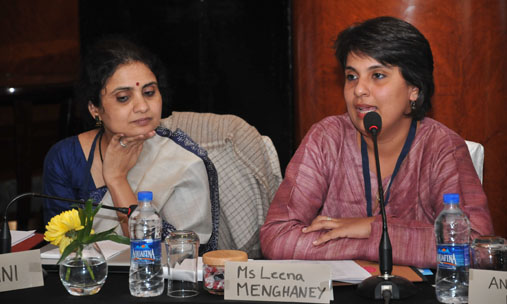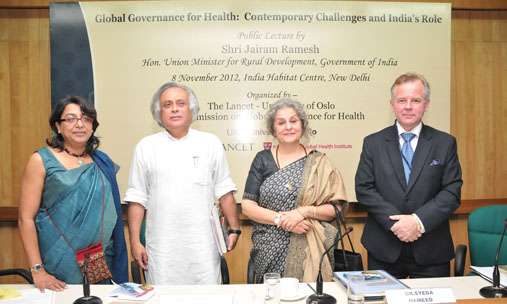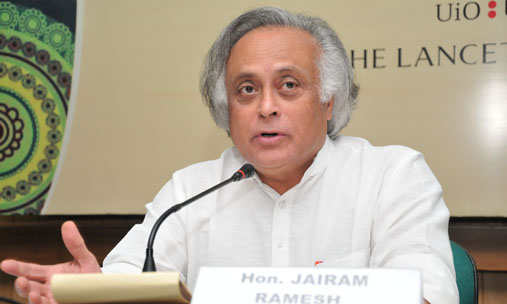"One of the challenges for realizing the right to health is that its considerations is absent in other international treaty regimes”. This was stated by UN ‘s Special Rapporteur on the Right to Health, Advocate Anand Grover. He explained the international legal basis for the right to health and outlined challenges on how to safeguard the right in an unequal world, as he opened the pre-commission seminar the 8th of November. The seminar on global governance for health from an Indian perspective was organized for the Commission to illustrate that health risks in many cases need solutions on a global level.
The Indian cases portrayed the public’s mobilization and responses to health risks related to global governance issues such as international trade, intellectual property, development aid, multilateral and geo-political conflicts.
Ms Sarojini from Sama Resource Group for Women and Health questioned in her presentation about Reproductive Tourism in India, whether the concern for the Indian surrogate mother is on the agenda at all. She called for a national legislation grounded in the human right framework, which regulates both commercial and noncommercial surrogacy and safeguards the health, human rights and autonomy of surrogate women.
In the presentation about the effects of genetically modified crops upon health and livelihoods, Dr P.M. Bhargava recognized the importance of the positive power of GM technology (e.g. to make cheap drugs), but stressed the need for socio-economic needs assessments and independent testing mechanisms to assess risks for among others human and animal health, ecological diversity, social problems and unintended effects.
Some of the main messages in the presentation about access to medicines by Ms Leena Menghaney from Doctors without Borders was that TRIPS and FTAs should be seen as undermining access to affordable generic medicines in developing countries and that these countries should be able to locally examine patents, based upon agreement texts made publicly available at the time of negotiations. She also endorsed the R&D treaty as a long term sustainable solution to the access and innovation crisis in pharmaceuticals.
 From the left: Sarojini NB and Leena Menghaney.
From the left: Sarojini NB and Leena Menghaney.
A strong critique of the “food-drug confusion” created by powerful commercial interests in malnutrition was put forth by Dr Vandana Prasad while she informed the Commission about expansion of so called neutraceutical products in India. Rather than really providing food security for the Indian population and dealing with the problem of malnutrition, the government has sought a “quick fix” through importation of neutraceuticals, negatively impacting on local food produce, livelihoods, food culture, household expenditures, and community control over resources, she said.
Sathyu Sarangi questioned the lack of corporate liabilities in the case of the Bhopal gas leak disaster. The disaster is considered one of the world’s worst industrial disasters, killing more than 16 000 people, and wounding hundred of thousands. The contamination is still ongoing through polluted groundwater. “What are important factors in this case is the complicity of the elected government, the role of Union Carbide (responsible for the leak) in downplaying the effects and its active suppression of information” said Sarangi. “Diseases caused by environmental pollution should be considered a corporate crime and international corporations must be held accountable for their actions”, he continued.
In the evening after the presentations, a public lecture on contemporary challenges and India’s role in global governance for health was given by the Indian Hon. Minister of Rural Development, Mr. Jairam Ramesh. “In India poverty is health poverty” he claimed in his inspirational talk about the “ twin sisters” of health and poverty. According to him, there is now an enlightening return to the provision of the basics, such as access to water and sanitation. Global governance must necessarily be anchored in local government and community institutions, as these play an essential role in the delivery of basic necessities, such as potable water, he said.
 From the left: Jashodhara Dasgupta, Hon. Minister Jairam Ramesh, Dr, Syeda Hameed and Ole Petter Ottersen.
From the left: Jashodhara Dasgupta, Hon. Minister Jairam Ramesh, Dr, Syeda Hameed and Ole Petter Ottersen.
Dr. Syeda Hameed, member in charge of health at the Indian Planning Commission, chaired the session, and Ole Petter Ottersen and Jashodhara Dasgupta were participants in the panel. In total, more than 80 guests from Indian media, NGOs, academia, government and foreign services attended the public lecture together with the Commissioners.
The sharing of Indian perspectives on the role of global governance in protecting and promoting peoples’ health helped to further ground and inspire the Commission’s deliberations taking place on the 9th and 10th November.
 The Hon. Minister of Rural Development gave an inspirational and honest talk about the many challenges India is facing in tackling poverty.
The Hon. Minister of Rural Development gave an inspirational and honest talk about the many challenges India is facing in tackling poverty.
